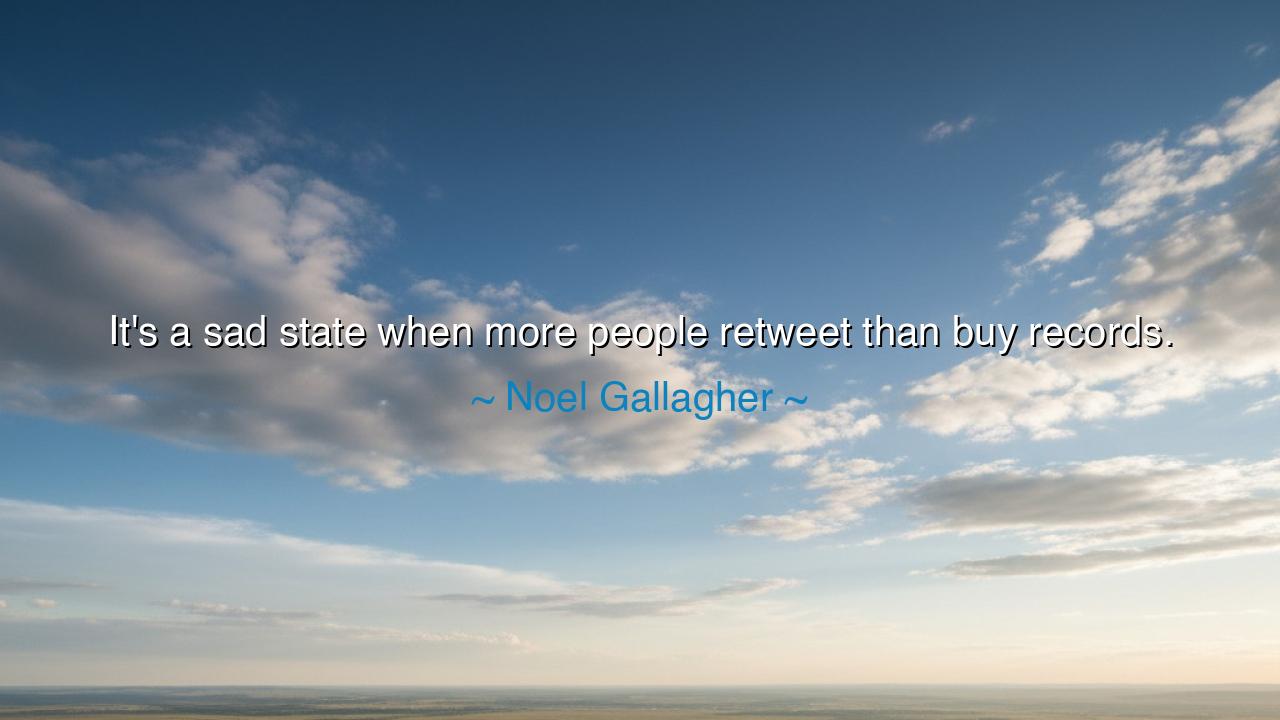
It's a sad state when more people retweet than buy records.






The words of Noel Gallagher, “It’s a sad state when more people retweet than buy records,” carry the weight of a lament for a changing world. They are not only the words of a musician, but of one who has lived through the golden age of music as a tangible art—an era when to own a record was to hold a piece of the artist’s soul in your hands. His grief is directed at the transformation of art into a fleeting gesture, where a click of a button replaces the act of true devotion, and where retweets are mistaken for love.
The origin of this statement lies in Gallagher’s long journey through music. Rising in the heart of the Britpop era with Oasis, he knew firsthand the power of records to unite generations, to shape identity, and to create movements that lived beyond mere sound. A record was once an offering that required sacrifice: money earned, time spent, a decision made. To purchase was to commit, to align oneself with the message of the artist. Yet in the modern age, he sees that commitment replaced with the shallow echo of digital approval—ephemeral recognition without true support.
History too speaks of this transformation. In the days of the poet Homer, words were carried by the voice, committed to memory, and passed down through generations. They had weight, for they demanded effort to preserve. But as societies shifted, so too did the relationship between art and audience. When the printing press was invented, many feared that words, so easily multiplied, would lose their gravity. Gallagher’s words stand in this same tradition of warning: that ease may destroy depth, and that art, if reduced to empty gestures, loses its sacred bond with those who receive it.
His lament also reveals a truth about the value of art. To buy a record is not merely a transaction—it is an act of respect. It affirms the labor of the artist, who pours life and soul into creation. A retweet, though flattering, costs nothing, demands nothing, and often signifies nothing beyond the moment. In this shift, Gallagher mourns the loss of reciprocity: the sacred exchange between artist and audience, where one gives creation and the other responds with devotion. Without this exchange, the bond weakens, and art itself risks becoming hollow.
Yet there is more than sorrow here; there is also a call to responsibility. Gallagher’s grief is a mirror held up to us, the audience. Do we consume art as if it were air, free and endless, or do we honor it with the weight it deserves? His words challenge us to remember that every song, every record, every poem is born of labor, sacrifice, and vulnerability. To treat it as disposable is to dishonor both the artist and ourselves, for in diminishing art, we diminish our own humanity.
The lesson is clear: support what you love, not only with words, but with action. Do not mistake a digital gesture for true participation. If music moves you, buy it. If a writer stirs you, read their book. If an artist inspires you, sustain them with more than praise. For only by investing in the art we love can we ensure that it continues to be made. Retweets fade in seconds; records endure for lifetimes.
Practically, this means cultivating habits of intentional appreciation. Choose to engage with fewer works but with greater depth. Support artists not only through social media, but through tangible commitment. Teach children that music and art are not commodities to be consumed and discarded, but treasures to be cherished and preserved. Let us restore to art the dignity it deserves, so that creators are sustained, and so that our culture does not collapse into hollow gestures.
Thus, Noel Gallagher’s lament becomes not just the complaint of a veteran musician, but a teaching for all generations. Art is life, and life demands more than retweets. To honor art is to honor the soul of humanity itself. Let us not be a people who only click and scroll, but a people who choose, who invest, who remember that to love truly is to act. In this, the sadness of his words can be transformed into hope: that even in the digital age, we can still choose to cherish what is real.






AAdministratorAdministrator
Welcome, honored guests. Please leave a comment, we will respond soon